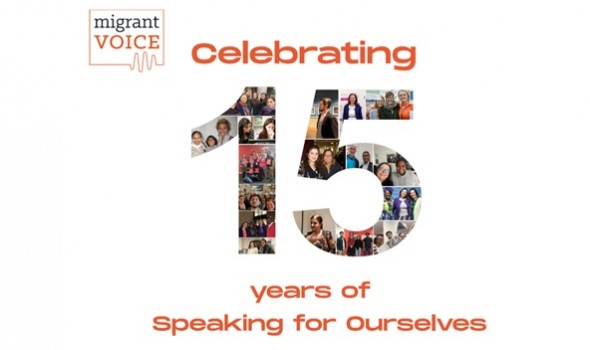Letter from the editor: Migrant Voice newspaper
Letter from the editor: Migrant Voice newspaper

What an extraordinary 15 years!
When I and a group of migrants and friends established Migrant Voice in 2010 the media was full of migrant stories. But few of the stories were by migrants or quoted migrants. Even large non-government organisations were making decisions about what to say about migrants: we migrants were told “the experts” knew more than we did.
The inevitable result was an increasingly negative debate, inaccurate media reports, wild claims by politicians, inexorably followed by a perfect storm of bad practices and policies, including:
- an ill-conceived rash of measures in response to the desperate humanitarian crisis in Calais; imposition of the “hostile climate”, a cap on net migration; increased spending on security measures, some of them crazy, in an effort to stop “small boats”; the “Go Home” van that my family and I and many, many migrants felt was directed at all of us; scandals such as Windrush and the kneejerk banning of tens of thousands of overseas students in response to a TV programme.
It’s a trust-shattering list. And there’s more:
- The nature of the Brexit debate, with EU nationals feeling for the first time like migrants in a place they called home; war in Syria and Ukraine and other pressing reasons to leave countries such as Eritrea and Hong Kong; Nigel Farage’s infamous “Breaking Point” poster; the Illegal Migration Act stripping more rights from migrants — and confirming the link between migration and illegality in the public mind; the pie-in-the-sky Rwanda scheme; the drumbeat of the 'Stop the Boats' rhetoric.
And now, within months of a new government taking office, we have already experienced frightening riots targeting asylum seekers — the bitter fruits of years of negative rhetoric and scapegoating; increased deportations and relentless treating of migration as a 'problem'; and no sign that the administration will take responsibility for educating the public to the truth that migrants’ are an integral part of the community and make a hugely positive contribution to the country.
Yet despite the politicians' failings and outbursts of media hysteria, most of the British public appreciate that without migrant workers the NHS would not exist, happily put their elderly parents into the hands of migrant care workers, relish the wonderful new foods and restaurants that have transformed our cuisine, thrill to the medals and excitement generated by migrant athletes, dance and sing along to migrants’ music that has become part of the soundtrack of British life, are entertained by migrant detectives tackling crime on TV, earn their living from migrant businesses, and elect migrant politicians.
These 15 years have been an emotional roller-coaster for migrants and for Migrant Voice staff, politically and emotionally.
Two personal examples of many:
- when I first met some of the 30,000 international students whose visas were suddenly and unfairly cancelled for allegedly cheating in an English-language exam, I felt overwhelmed and a sense of terror that such a travesty of justice could occur to young men and women who could be my son or daughter.
- when the riots erupted in August 2024 they triggered frightening memories of my first years in the UK where I experienced racism, verbal attacks and a lit cigarette pushed through my letterbox which started to burn my carpet.
Looking back, Migrant Voice is happy to have made a significant contribution to one of the most notable achievements in this difficult decade: a marked uptick in the number of migrant voices in the media and in the corridors of power. We have been active in every aspect of both traditional and new media, thanks to the trust given to us by hundreds, thousands, of migrants who came to us, opened their hearts and bared their souls to tell their stories. It has been a privilege to be part of their lives and to help make their lives part of the British story.
This one-off newspaper is itself an example of the many ways we tell our own migrant stories and share them with the public. No single publication or social media meme can cover the amazing variety of migrant lives, but we hope the paper offers at least an introduction to who we are: from the young Ukrainian selling cappuccinos and Borscht in a trendy London cafe to an African woman fighting to re-establish her life after escaping from modern slavery; from a successful Brazilian businessman who started life here without a word of English to volleyball players from around the world in a Scottish park; from careworkers fighting racism to a woman from Pakistan who is literally helping Birmingham to bloom.
Some of the testimonies are bleak, some are inspirational. They are all part of British life yesterday, today and tomorrow.
Nazek Ramadan
Director, Migrant Voice
- Click here for a digital version of the newspaper. Individual articles can be found in various sections of this website.


